As Trump support merges with Christian nationalism, experts warn of extremist risks
Suddenly, it seems, the term “Christian nationalism” is everywhere.
News reports about a rising conservative think tank express concerns about its ties to the movement. A high profile documentary asks whether a new wave of believers will wash away democracy in America. And Donald Trump, the presumptive GOP nominee, is increasingly embracing the narrative that he has been chosen by God — that only he can save America from Satan.
Last month, a trio of convoys calling themselves “God’s Army” converged on the U.S.-Mexico border to protest what they called a flood of immigrants into the country. On stages draped with Trump flags and banners with phrases like “An appeal to heaven,” they prayed and proselytized. Between trailers in parking lots, they held baptisms in stock tanks. Worship music floated through the red, white and blue of hundreds of flags.
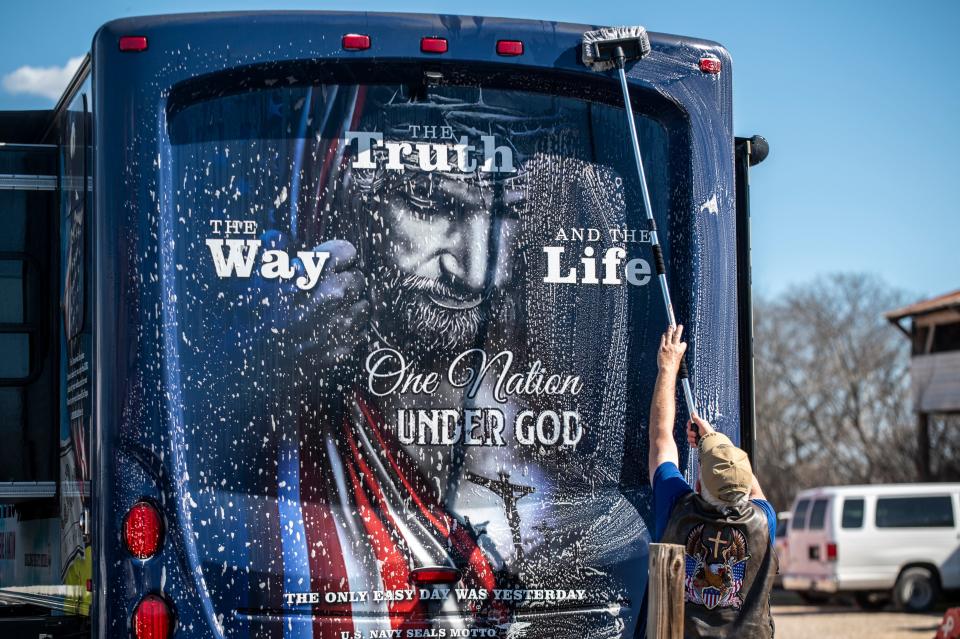
Trump has ramped up his spiritual imagery. He told a convention of religious broadcasters last week that he was “taking bullets” for Christians. “They want to tear down crosses where they can,” Trump said of his opponents. “But no one will be touching the cross of Christ under the Trump administration, I swear to you.”
The concept of Christian nationalism — technically, the belief that the secular government should favor Christianity or even be replaced by it — existed long before Trump’s rise to power. But experts said the former president’s embrace of the movement and his increasing use of Christian nationalist language is something altogether new.
The fervor for Christian nationalist ideology has catalyzed an active political movement, experts in both religion and extremism told USA TODAY. So while they have long been alarmed about Christian nationalist ideas, they see the new movement as an army of sorts, ready for a mission, with Trump as its general. They’re worried about what action the most extreme members could be directed to take if he wins – or loses – in November.
The violent Jan. 6 insurrection, they warn, was soaked with the rhetoric and symbols of Christian nationalism. And unlike other groups at the center of that attack, like the Oath Keepers and Proud Boys — whose leadership was gutted by criminal prosecutions — the extremist element has only swelled in the last three years.
“We can't just laugh these people off anymore and treat them as a sideshow,” said Bradley Onishi, an assistant professor of religion at Skidmore College. “I think we should be very worried. History has already shown us that these folks are ready to take action.”
What are Christian nationalism and the Seven Mountain Mandate?
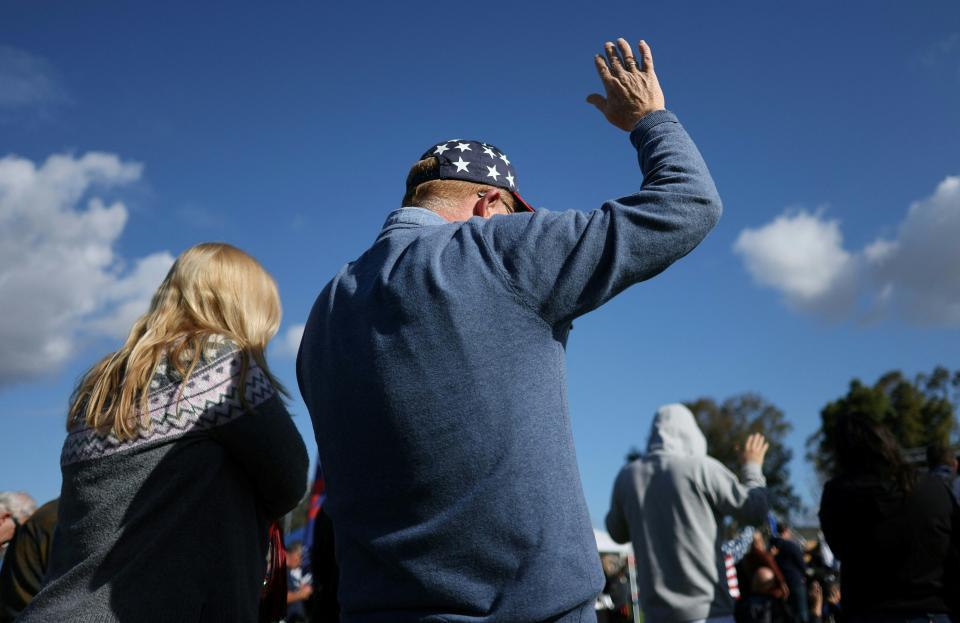
Christian nationalism has been a part of the American body politic since before the founding of the republic, said Andrew Whitehead, an associate professor of sociology at Indiana University-Purdue University, Indianapolis.
Christian nationalists believe broadly in the orthodox and theological beliefs of Christianity, Whitehead said. Many believe in erasing the boundaries between church and state. That can range from thinking religion should play a larger role in government to believing a president is a literal messiah sent by God.
In practice, and particularly in its most modern form, Christian nationalism also attaches other cultural beliefs and values, Whitehead said – usually with a vision of America that includes only Christian, straight, white, cisgender people.
“Those who embrace Christian nationalism would say, ‘Yeah, we're supposed to love our enemies and take care of our neighbors and support those around us.’ But what they then do is have a very particular definition of who the U.S. is,” Whitehead said. “Those who might be immigrating, or who are refugees, or who are religious minorities, or gender and sexual minorities — these are folks that tend to be defined outside the U.S.”
The contemporary movement has created its own doctrines, including one known as the “Seven Mountain Mandate.”
This concept – which followers believe originated with a message from God to a trio of evangelists in 1975, and which became popular in the early 2000s – proposes that American Christians should seek to dominate seven “mountains” of modern society: religion, education, family, media, entertainment, business, and government.
Beyond its original purpose, referring to the Seven Mountain Mandate, or some version of it, has become a rallying cry for modern Christian nationalists, said Joseph Wiinikka-Lydon, a senior research analyst at the Southern Poverty Law Center, who has studied Christian nationalism for years.
“It's a great meme for Christian supremacy, and a lot of people are picking it up and running with it.” Wiinikka-Lydon said.
At the 2020 Conservative Political Action Conference, referring to Trump, far-right influencer Charlie Kirk declared: “Finally we have a president that understands the seven mountains of cultural influence.”
Late last month, on the same day he published an opinion stating that frozen embryos should be considered people, Alabama Supreme Court Chief Justice Tom Parker appeared to express support for the Seven Mountain Mandate on an online radio show.
“God created government,” Parke said on the show, which the host also often uses to promote QAnon conspiracy theories, “And that's why he is calling and equipping people to step back into these mountains right now.”
Wiinikka-Lydon said there’s little doubt the ideas are spreading in popularity and reach.
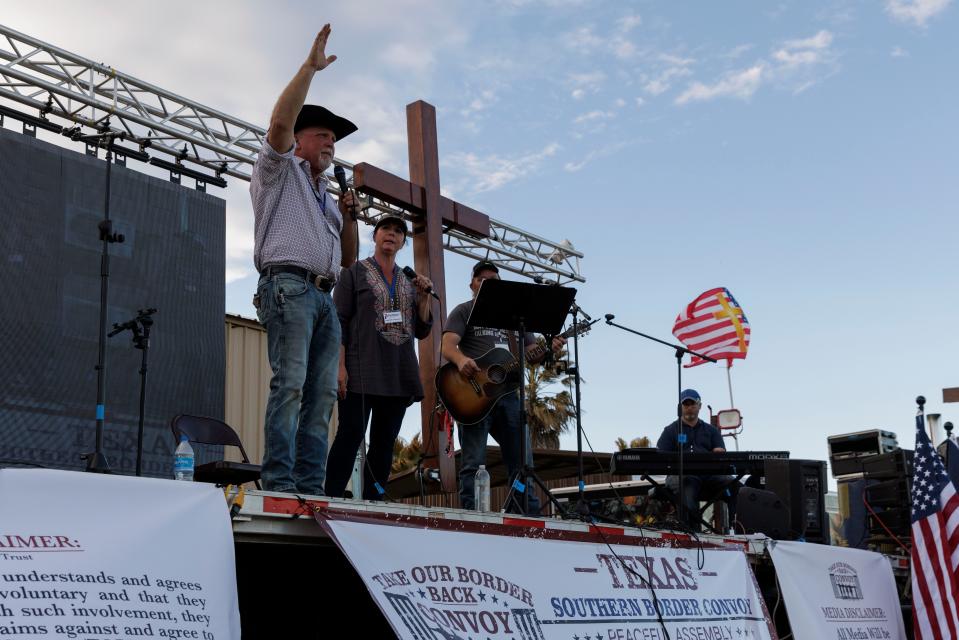
“They are fringe, but they’re a fringe that is well-organized and well-resourced,” he said. “I would say right now, they're a fringe trying to take over the world.”
And experts agree that the recent leap from fringe idea to fundamental motivator comes from the popularity of a single person – Donald Trump.
Christian nationalism, the ‘Deep Church’ and Trump’s campaign
While the Christian nationalism credo has been around for at least a century, it lacked a high-profile figurehead before Trump, said Brian Kaylor, a Baptist minister and author who has written extensively about the movement.
Trump — a thrice-married, non-church-going businessman who has been found liable for rape and who faces dozens of criminal charges across the country including bribing a porn star with whom he had an extramarital affair — has always courted mainstream Christian voters and evangelicals, Kaylor said.
But since losing the 2020 election, Trump has increasingly embraced the rhetoric, symbols and ethos of Christian nationalism, Kaylor said, especially in recent months.
In January, Trump shared a video on his Truth Social media platform that claims “God gave us Trump.” He has posted religious images of himself on Truth Social, including reposting an image portraying him as Jesus in a courtroom sketch last October. The former president’s campaign rallies have become increasingly similar to megachurch services, Kaylor said, playing worship music and with collective prayers for the crowd.
“It’s the MAGA church,” Kaylor said. “It even has the feeling of the start of a new religion.”
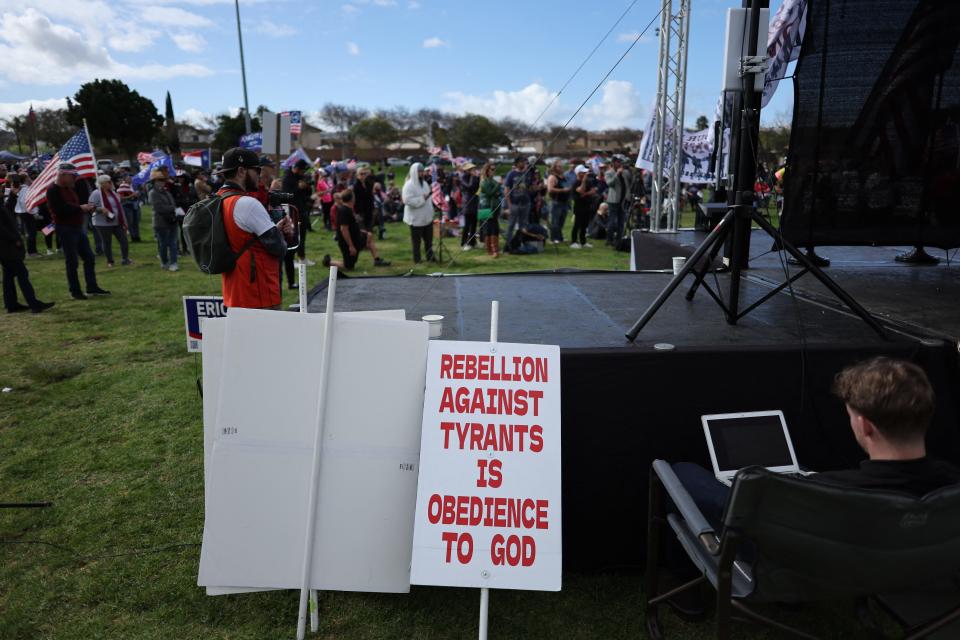
What Trump is doing goes far beyond former presidents’ embrace of evangelicalism or public statements about faith, Kaylor and several other experts said. It even goes beyond the campaigns of famous televangelists and faith leaders, whose goal was always to bring new followers into the fold of established churches.
Instead, Trump has been derisive about “mainstream churches” Kaylor said. In the MAGA church, the main purpose isn’t to direct the flock toward traditional doctrine, it is to paint Trump, himself, as the only person capable of “saving” Christianity, he said.
“They’ll talk about the 'Deep Church,’ not just the ‘Deep state,’ and they’ll criticize pastors who aren’t preaching the cause of Trump,” Kaylor said.
The Trump campaign did not respond to a request for comment.
Whitney Phillips, a University of Oregon professor and co-author of a forthcoming book “The Shadow Gospel,” cautioned that some people who are labeled Christian nationalists should more accurately be described as “demonologists.” This faction of the far-right, which views liberals as satanic and demonic, represents a radical and dangerous movement that shouldn’t really be described as Christian, Phillips said.
The Christian nationalist label risks misrepresenting some Trump supporters, who don’t care about Jesus at all, Phillips said. “An actual white Christian nationalist wants the country to adhere to biblical principle — wants law to be based on the Bible,” Phillips said. “A demonologist just wants to destroy liberals.”
Erika D. Gault, an associate professor of Africana studies at the University of Arizona who studies religious history, said she believes Trump knows exactly what he’s doing. By doubling down on Christian nationalist rhetoric, the former president is borrowing from a long playbook of using religion to shape his own myth.
“Christianity has always been — as (Alexis) DeTocqueville called it — ‘Irresistible’,” Gault said, adding sardonically: “It’s been very useful in building a nation, so why wouldn’t you use it and exploit it to your own advantage?”
Like other Christian traditions that emerged before it, this religious uprising borrows the liturgy, symbols and trappings of Christian tradition, Kaylor said, “but then they imbue it with a new emphasis and a different focus.”
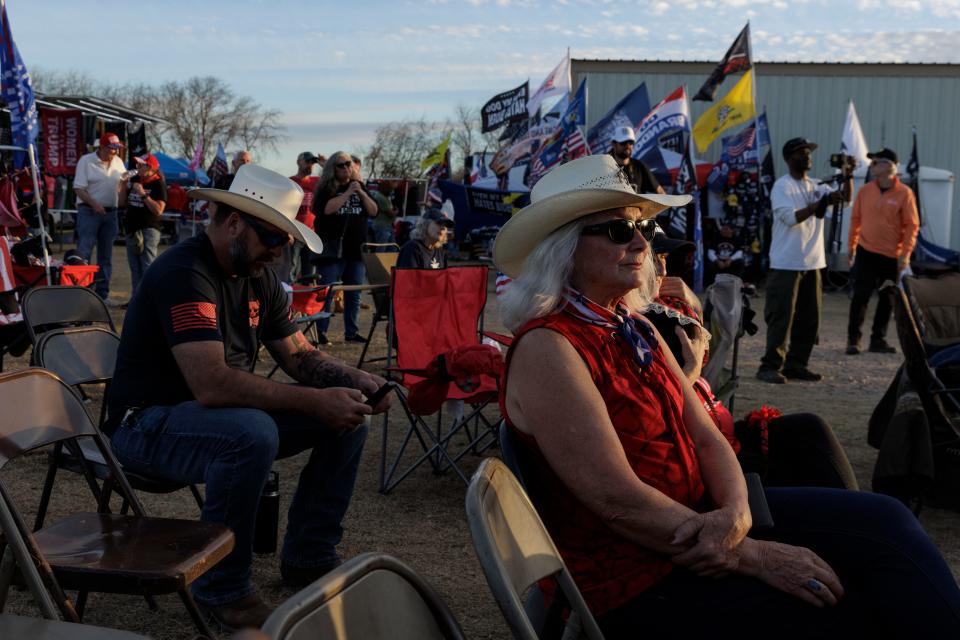
For many, that focus is currently on the U.S.-Mexico border and the perceived fight against Democrats.
This willingness to frame a national political battle as a conflict between good and evil concerns experts on violent domestic extremism.
Debate over whether Christian nationalism is Christian
Stephen Wolfe, who authored the book “The Case for Christian Nationalism,” argues that the term itself has been weaponized by the left.
He did not agree to an interview for this story, but in a 2023 interview with a Christian YouTuber, he said Christians should “reclaim” the term.
“One of the reasons I like ‘nationalism’ is that it assumes that there’s a national will,” Wolfe said. “It’s people, together, saying ‘We are going to order ourselves for our good, and we’re going to have the will and the resolve to make that happen.”
But experts on Christian nationalism are quick to note that, for many Christians, associating these ideas with Christianity at all should be troubling.
Trump’s endorsement of the idea that he has been “chosen by God,” and the spreading of this theory by pro-Trump preachers, for example, is offensive to many Christians, Kaylor said.
“They’re using language that’s meant to be about Jesus and scripture and applying it also to Trump,” Kaylor said. “Historically orthodox Christianity would call that blasphemy.”
In addition to possible violence from adherents of these beliefs, Christians and non-Christians alike should also be concerned about Christian nationalist views on democracy, said Whitehead, who has published several research papers about the movement.
“They're more likely to be comfortable with … the idea we may need a ‘strong man’ to come in and enforce social order,” Whitehead said, referring to surveys conducted for his research. “There's an internal consistency to the logic that they believe that God has a particular plan for the United States, and the only way for the United States to stay in God's graces is to align itself with God's command.”
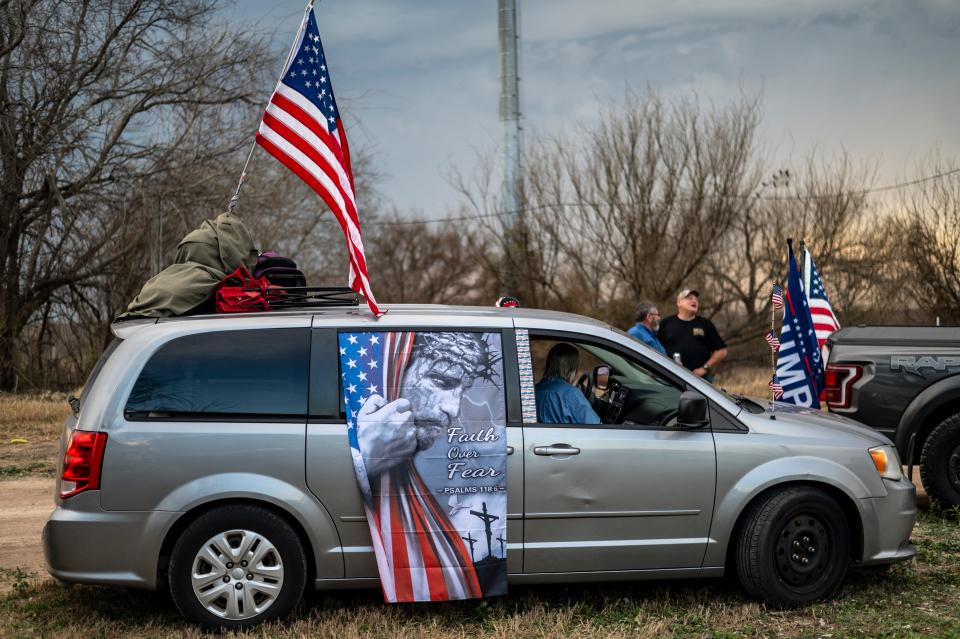
A poll released in late February by the nonpartisan Public Religion Research Institute found that two-thirds of Americans reject or are skeptical of Christian nationalism. In more liberal states like California and New York, the percentage of rejection was even higher.
But the poll suggests that in deeply conservative and religious states, Christian nationalism is no longer seen as a fringe movement.
In five red states, at least 45% of respondents said they were adherents or sympathizers of Christian nationalism: North Dakota (50%), Mississippi (50%), Alabama (47%), West Virginia (47%) and Louisiana (46%).
Where church meets violence
Politicians have long courted religious voters, and modern political movements — as varied as the Civil Rights movement and the effort to overturn Roe vs. Wade — have long been rooted in Christian beliefs.
But when a swath of the population believes their presidential candidate was literally chosen by God, it poses an extraordinarily difficult — and dangerous — scenario when that candidate loses, Onishi, the religious studies professor, said.
Onishi said the Jan. 6 insurrection wasn’t just an outpouring of political discontent. The riot was catalyzed by the religious — the overtly Christian nationalist — fervor of the pro-Trump crowd, he said. Unable to conceive that God’s chosen candidate had lost, thousands descended on the U.S. Capitol where they prayed, invoked scripture, then ultimately started breaking windows.
Back in 2021, Trump had already courted evangelical voters, but he hadn’t yet fully ensconced himself in Christian nationalism, Onishi said.
Years later, that has changed, he said.
“Trump has actively cultivated the story that he's divinely appointed, that he is the one who God wants to be in charge, and that the issues Trump fights for are the issues God is fighting for, so if you are on the side of Trump, you're on the side of God and vice-versa,” Onishi said.
That should make Americans, including Christians who support Trump, nervous, said David Buckley, an associate professor of political science and religion at the University of Louisville in Kentucky.
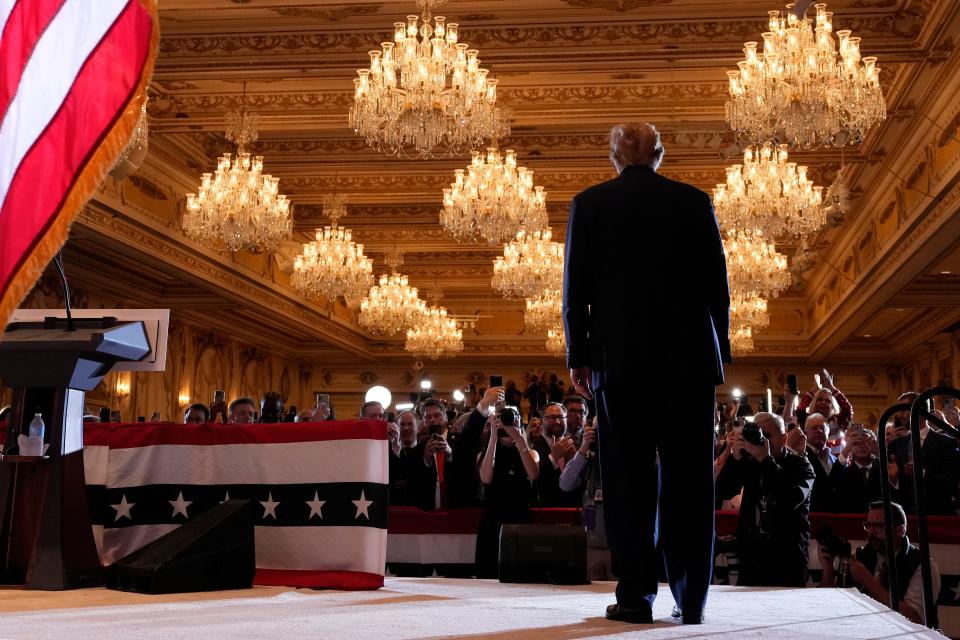
Buckley and other researchers have completed several studies on the correlation between Christian nationalism and political violence. He said this research shows that Christian nationalists are more likely to believe in conspiracy theories — for example, that presidential elections are stolen — and are also much more likely to believe that using violence for political means is acceptable.
“Your average American should be especially concerned about the extent to which Christian nationalism has become tied up with other dispositions like conspiratorial beliefs and racialized grievance, to create a cocktail that our research shows is really potent,” Buckley said.
Religious belief has long proven a powerful motivator for political change in the United States, Buckley said. Often, that change has been positive.
And in the case of Trump’s use of Christian nationalism to rally his troops, Buckley and others remain concerned not just about the potential for violence, riots and potential acts of terrorism if Trump loses in November, but also for the future of democracy if he wins.
Will Carless is a national correspondent covering extremism and emerging issues. Contact him at [email protected]. Follow him on X @willcarless.
This article originally appeared on USA TODAY: Trump and Christian nationalism: Experts warn of extremist threats
